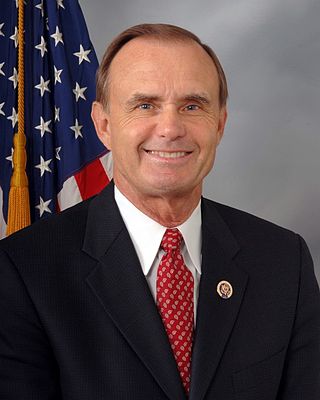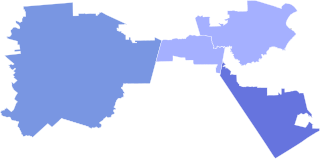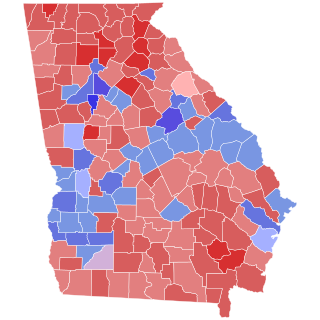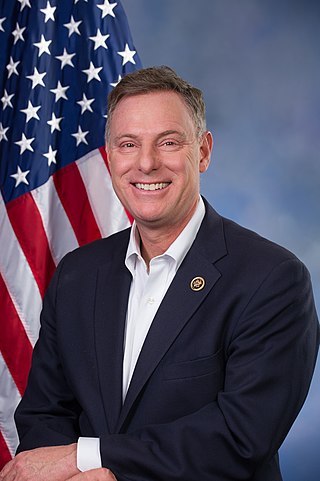
Henry Bonilla is an American politician and former congressman who represented Texas's 23rd congressional district in the United States House of Representatives. He was defeated in his bid for re-election by Ciro Rodriguez, a former Democratic member of Congress, in a special election runoff held on December 12, 2006. His term expired January 3, 2007 when the 110th Congress officially began.

The 2006 Texas gubernatorial election was held on November 7, 2006, to elect the governor of Texas. The election was a rare five-way race, with incumbent Republican governor Rick Perry running for re-election against Democrat Chris Bell and Independents Carole Keeton Strayhorn and Kinky Friedman, as well as Libertarian nominee James Werner.

In the fall of 2005, a special election was held in California's 48th congressional district to choose a United States representative to replace Republican Christopher Cox, who resigned effective August 2, 2005, to become Chairman of the U.S. Securities and Exchange Commission. A Special primary election was held on October 4. Because no candidate received more than 50% of the vote, a runoff general election took place on December 6, 2005. The top vote getter from each party moved to the runoff contest, which only required a candidate to receive a plurality of the vote. Republican candidate John Campbell ultimately won the runoff with only 44% of the vote, as there were three major candidates, rather than the usual two.
California's 50th congressional district is a congressional district in the U.S. state of California, and encompasses parts of the Mid-Coast and northeastern parts of San Diego County. Scott Peters is currently the U.S. representative for California's 50th congressional district.

Brian Phillip Bilbray is an American politician who served in the U.S. House of Representatives from 1995 to 2001 and again from 2006 to 2013. He is a member of the Republican Party.

Francine Pocino Busby is a former member of the school board in Cardiff, California and was the chair of the San Diego County Democratic Party. She has four times been the Democratic candidate for Congress in California's 50th congressional district, in North San Diego County. In 2004, she ran unsuccessfully against incumbent Republican Congressman Randy "Duke" Cunningham. Before his term was up, Cunningham resigned due to his conviction on bribery charges, and Busby ran in the June 2006 special election to replace him; she lost to Republican Brian Bilbray, who again defeated her in the 2006 general election that November. She also ran unsuccessfully against Bilbray in 2010.
An open primary is a primary election that does not require voters to be affiliated with a political party in order to vote for partisan candidates. In a traditional open primary, voters may select one party's ballot and vote for that party's nomination. As in a closed primary, the highest voted candidate in each party then proceeds to the general election. In a nonpartisan blanket primary, all candidates appear on the same ballot and the two highest voted candidates proceed to the runoff election, regardless of party affiliation. The constitutionality of this system was affirmed by the Supreme Court of the United States in Washington State Grange v. Washington State Republican Party in 2008, whereas a partisan blanket primary was previously ruled to be unconstitutional in 2000. The arguments for open primaries are that voters can make independent choices, building consensus that the electoral process is not splintered or undermined by the presence of multiple political parties.

The 2006 Texas 22nd congressional district election for the 110th Congress was held on November 7, 2006, and attracted considerable attention because this district was represented by former House Majority Leader Tom DeLay, a prominent member of the Republican Party, who resigned after being indicted and subsequently winning the Republican primary. Because of Texas state law, Republicans, in order to hold on to the seat, would have had to win a write-in campaign, something that has only been done four other times in the history of U.S. congressional elections.

The 2006 Georgia's 4th congressional district election was an election for the United States House of Representatives. The general election was held on November 7, 2006. However, the 4th was a heavily Democratic district, with the Democratic primary viewed as the more important contest. In that primary, DeKalb County Commissioner Hank Johnson upset the incumbent, Cynthia McKinney.

Shelley Ann Sekula-Gibbs is an American physician and politician, who serves as a director of The Woodlands, Texas Township board of directors. She served as a member of the United States House of Representatives, representing Texas's 22nd congressional district in 2006. A Republican, she won the special election to fill the seat for the last few weeks of the 109th United States Congress. Dr. Sekula-Gibbs has the distinction of being the first dermatologist and female physician to serve in the U.S. House of Representatives. She previously served as a city councilwoman in Houston, Texas from 2002 to 2006.

The 2008 United States Senate election in Georgia took place on November 4, 2008. The runoff election took place on December 2, 2008. Republican Senator Saxby Chambliss, first elected in 2002, sought re-election to his position as a United States Senator from Georgia. He was challenged by Democratic nominee Jim Martin and Libertarian nominee Allen Buckley. After a runoff election on December 2, Chambliss was elected.

Scott Harvey Peters is an American lawyer and politician serving as the U.S. representative from California's 50th congressional district since 2023, previously representing the 52nd congressional district from 2013 to 2023. His district includes both coastal and central portions of San Diego, as well as the suburbs of Poway and Coronado.
Duncan L. Hunter's 2008 presidential campaign began when fourteen-term Congressman and Vietnam War veteran Duncan L. Hunter of California announced his intentions to run for the 2008 Republican nomination for President of the United States in January 2007.

The political balance in Louisiana was heavily affected by the post-Hurricane Katrina departure from New Orleans. Heavily Democratic New Orleans lost some 1/3 of its population. The overall effect reduced the Democrats' base of support in the state and turned Louisiana into a Republican-leaning state thereafter. New Orleans remained Democratic, electing Mitch Landrieu as mayor in February 2010. In the 2008 elections, Louisiana sent a mixed result, with the election of U.S. Senator John McCain for President and the reelection of Democratic U.S. Senator Mary Landrieu. The other senator, at the time, was Republican David Vitter.

The 2008 congressional elections in Louisiana to determine representation for the state of Louisiana in the United States House of Representatives occurred November 4, 2008. Louisiana has seven seats in the House, apportioned according to the 2000 United States census. Representatives are elected for two-year terms; those elected will serve in the 111th Congress from January 4, 2009, until January 3, 2011. The election coincided with the 2008 U.S. presidential election.

The 2008 United States presidential election in California took place on November 4, 2008, in California as part of the 2008 United States presidential election. Voters chose 55 electors, the most out of any of the 50 states, to the Electoral College, who voted for president and vice president.

The 2010 Texas gubernatorial election was held on Tuesday, November 2, 2010, to elect the governor of Texas. Incumbent Republican governor Rick Perry ran successfully for election to a third consecutive term. He won the Republican primary against U.S. senator Kay Bailey Hutchison and political newcomer, Debra Medina. The former mayor of Houston, Bill White, won the Democratic nomination. Kathie Glass, a lawyer from Houston and previous candidate for Texas Attorney General, won the Libertarian nomination. Deb Shafto was the nominee of the Texas Green Party. Andy Barron, an orthodontist from Lubbock, was a declared write-in candidate.

Elections were held on November 2, 2010, to determine Mississippi's four members of the United States House of Representatives. Representatives were elected for two-year terms to serve in the 112th United States Congress from January 3, 2011, until January 3, 2013. Primary elections were held on June 1, 2010, and primary runoff elections on June 22.

The 2012 San Diego mayoral election was held on Tuesday, November 6, 2012, to elect the mayor of San Diego. Incumbent mayor Jerry Sanders was term-limited and ineligible to run for re-election.

The 2020 United States presidential election in California was held on Tuesday, November 3, 2020, as part of the 2020 United States presidential election in which all 50 states plus the District of Columbia participated. California voters chose electors to represent them in the Electoral College via a popular vote, pitting the Republican Party's nominee, incumbent President Donald Trump, and running mate Vice President Mike Pence against Democratic Party nominee, former Vice President Joe Biden, and his running mate Kamala Harris, the junior senator from California. In the 2020 election, California had 55 electoral votes in the Electoral College, the most of any state. Biden won by a wide margin, as was expected; however, California was one of six states where Trump received a larger percentage of the two-party vote than he did in 2016. This election also marked the first time since 2004 that the Republican candidate won more than one million votes in Los Angeles County due to increased turnout.


















